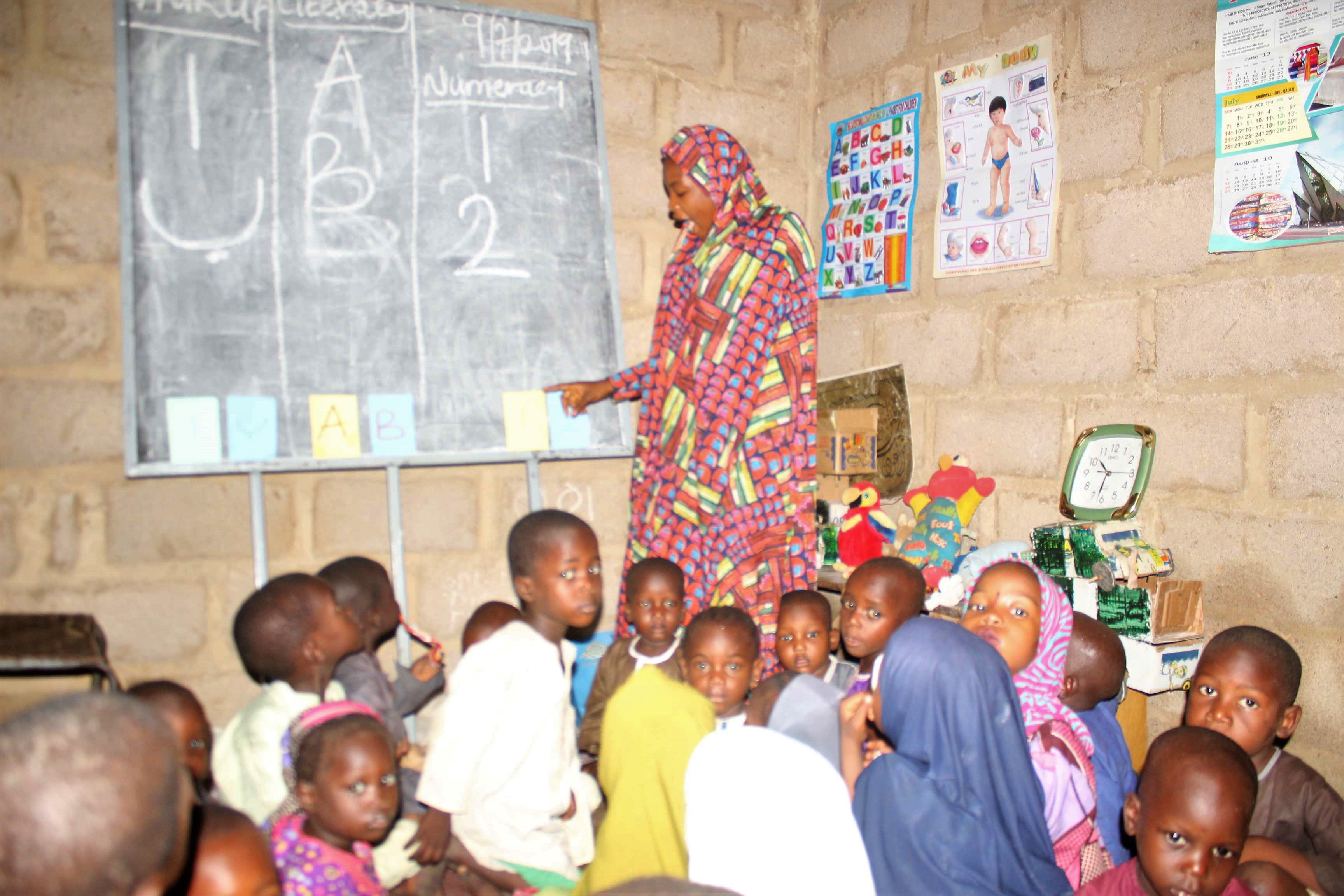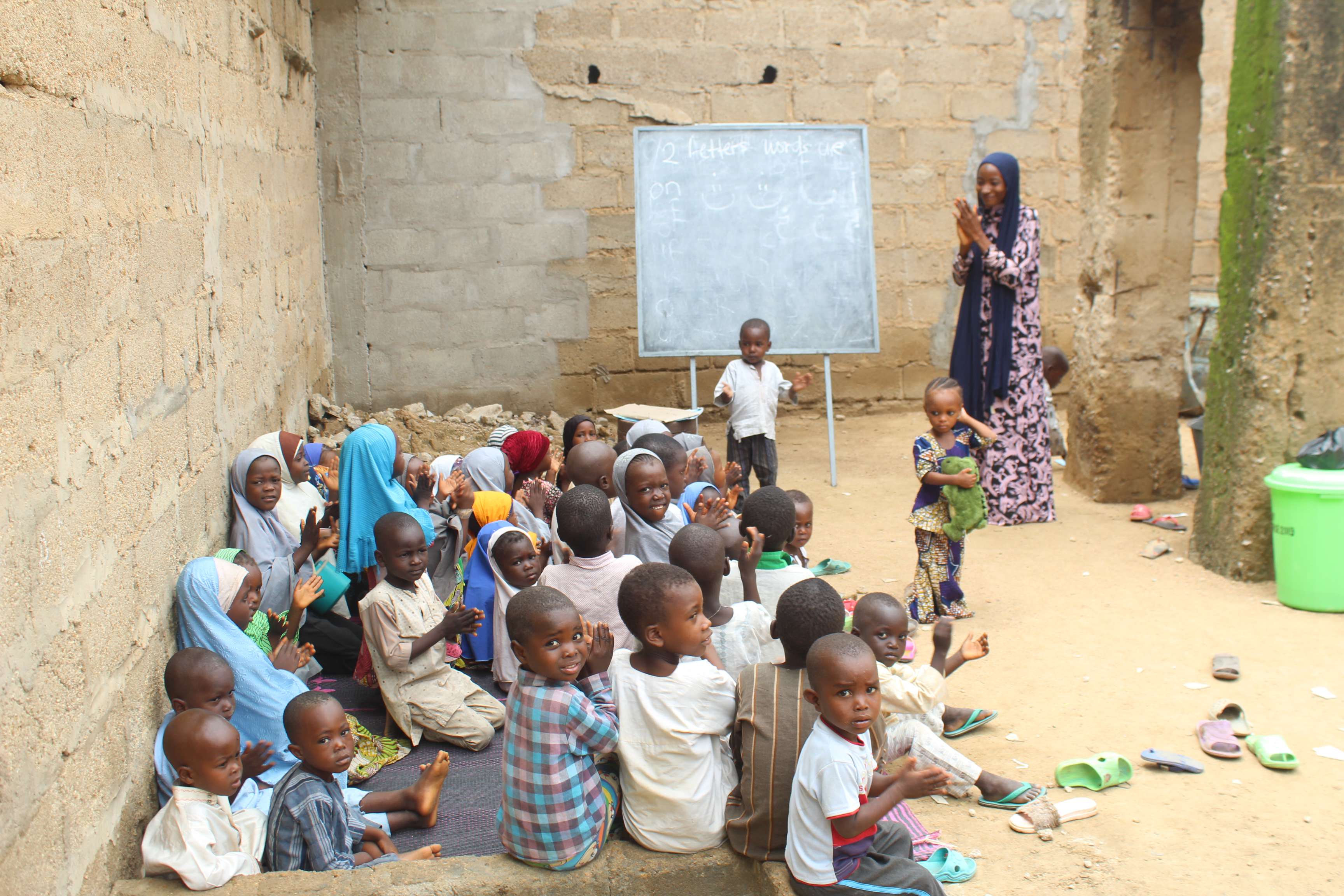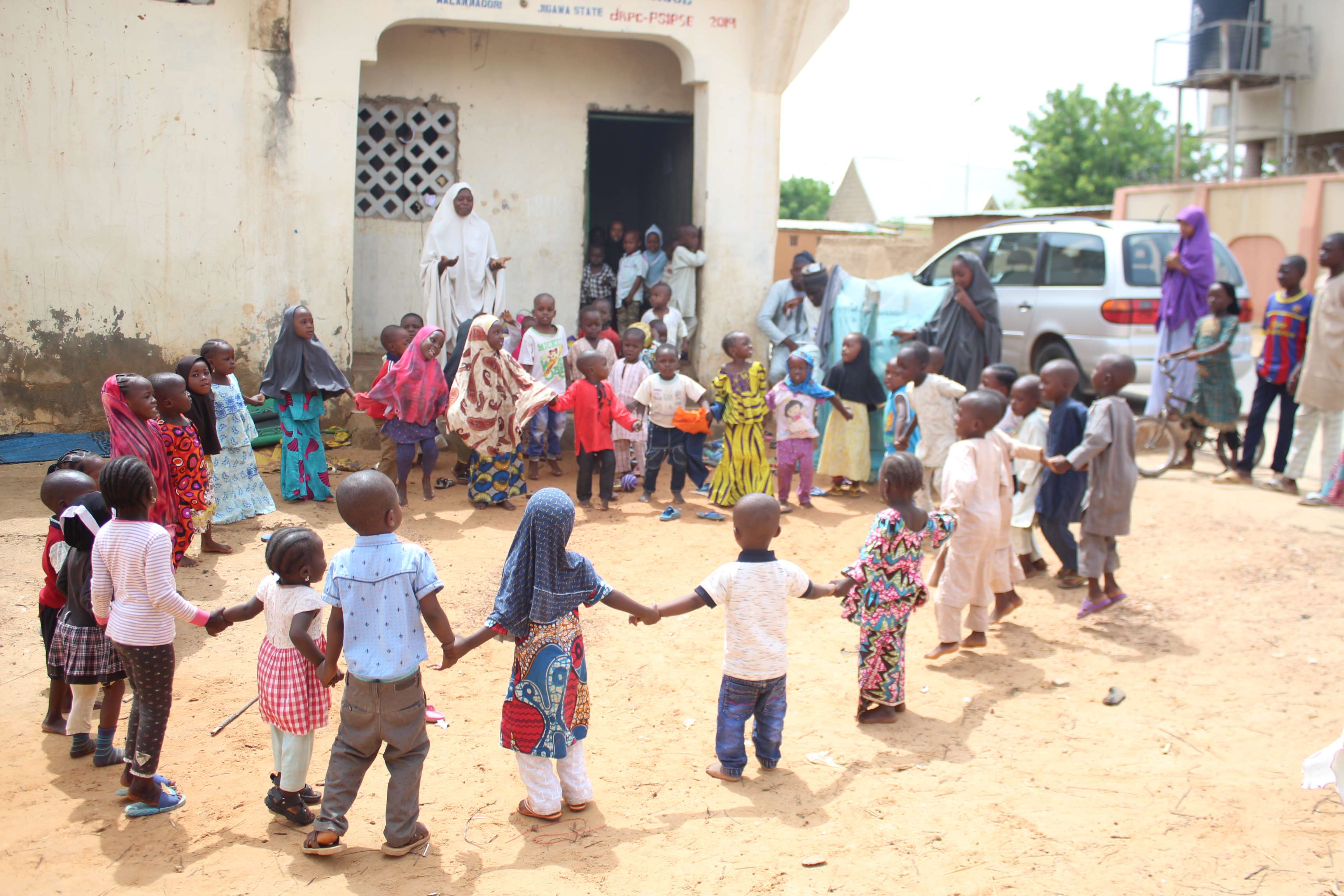SOJO | Empowering Nigerian girls, communities through early childhood education
Thanks to development Research Projects Centre’s Partnership to Strengthen Innovation and Practice in Secondary Education (PSIPSE) project, supported by MacArthur Foundation, girls who have graduated secondary school but could not transit to higher levels have been empowered to start up community-based Early Childhood Development (ECD) schools in Kano and Jigawa states

As you approach the narrow and dusty street that is home to Khadija’s early childhood development (ECD) school on this bright and sunny Wednesday morning of July at the highly densely populated Gobirawa neighborhood of Kano metropolis, all you could hear are the chatters and chuckles of infant children from the corridors of houses on both sides of the alleyway. For now almost four weeks, every morning of five weekdays, under-five children from across the neighborhood converge on the hallway that leads to Khadija’s home and similar hallways in the adjoining house and two opposite houses for what is their first experience with schooling.
Eighteen-year-old Khadija Abubakar, the proprietress of the community-based ECD nursery school is a 2018 graduate of Government Girls College (GGC) Dala in Kano metropolis. She started the school with a handful of pupils few weeks earlier in June, after undergoing series of trainings on the use of Early Childhood Care and Education (ECCE) curriculum and transforming its content into scheme of work as well as lesson notes. Within this short period, her school has attracted about seventy five pupils! Until May of this year, Khadija’s future had remained uncertain, not having secured the minimum required number of credits in the Senior Secondary Certificate of Education (SSCE) to enable her transit to higher level of education.
Fast forward to July, the young lady has found a new carrier in running ECD classes in her neighborhood – a vocation that has the potential to transform not only her young life but also that of innumerable socially disadvantaged children in her community. No doubt, this is a vocation Khadija has come to love – it has transformed her into a sort of an idol in the eyes of the neighborhood’s preschooler children who on sighting her would rush and cling to her body singing and dancing excitedly to the various nursery rhymes they learnt in her ECD school.
Khadija’s newfound carrier path is thanks to her participation in the scale-up phase of development Research Projects Centre, dRPC’s Partnership to Strengthen Innovation and Practice in Secondary Education (PSIPSE) project also known as #Skill4girl4life, which lasts between 2016 and 2019. Supported by MacArthur Foundation, PSIPSE seeks to increase access to secondary education and improve learning outcomes for marginalized populations in India, East Africa and Nigeria. In Nigeria, its major goal is expanding empowerment opportunities for schoolgirls in Kano and Jigawa states.
Under the pilot phase of PSEPSI (2013 – 2015), dRPC had built the capacity of teachers on the utilization of Nigeria’s New Secondary School Curriculum across eight and five select Government Girls Secondary schools (GGSS) in Kano and Jigawa states, respectively. The capacity building programme focused on classroom management and how best to teach the four core subjects of Mathematics, English, Civics and Entrepreneurship. Within same period, dRPC had also built the capacity of government education officials on the implementation of the new National Policy on Education (NPE) as well as that of principals of the selected girls’ secondary schools on leadership and management.
For PSIPSE’s scale-up phase, dRPC had focused on one of the four core subjects in the new secondary schools curriculum – entrepreneurship and crafts. Hence the project is now rechristened #Skills4Girls4Life. The decision to focus on student entrepreneurship was informed by the realization that whereas there was appreciable progress in the teaching and learning of three of the four core subjects (Mathematics, English, Civics) at the focal schools, there was a significant gap in Entrepreneurship.

“After the pilot phase during which we built the capacity of teachers on the utilization of the new curriculum especially the four core subjects, we realized there was a gap in entrepreneurship. Therefore, when we scaled it up in 2016 we concentrated on entrepreneurship and tagged the project #Skills4Girls4Life,” narrates Suleiman Mahmud, a programme associate at dRPC working on the PSIPSE project. “We focused on teaching the girls how to incorporate entrepreneurship in the learning of craft subjects. To strengthen their understanding of the craft subjects, we introduced After School Clubs (ASCs) where they were also taught crafts and entrepreneurship.”
Mahmud added that after the beneficiaries of the PSIPSE project’s graduation from secondary school in 2018, 70% of the girls got the requisite number of credits to secure admission into universities, polytechnics and colleges of education. However, the remaining 30% who managed to acquire either four credits or less couldn’t be admitted into any higher institution of learning. It was in a bid to also empower the girls that were not successful in transiting to higher level that dRPC decided to introduce the Early Childhood Development (ECD) component in PSIPSE’s scale-up.
“We asked them to come for a screening exercise; 8 girls from Jigawa and 12 girls from Kano emerged successful after the interview and screening exercises. Those who scaled through were provided with training to start up community-based ECD classes and since they were not trained teachers, we organized a capacity building training for the 20 selected girls from both Kano and Jigawa [including Khadija Abubakar]. Their capacities was built on methods of teaching, school hygiene, financial literacy as well as the practical aspect of ECD teaching carried out at selected schools offering ECD classes in Kano and Jigawa states,” recalls Mahmud.
After the training and in a bid to support the take-up of the ECD schools, dRPC furnished the newly trained ECCE teachers with take up grants and all necessary materials for the take up of their schools. From teaching and learning aids such as the One-Year Pre-Primary School Education Curriculum to lesson plans and school registers, to black boards, large water bowls, cups and sundry items such as erasers and sharpeners, the Centre ensured the girls lacked nothing that was necessary for the smooth take up of their schools.
There and then commenced series of monitoring visits to the community-based ECD schools by dRPC to determine whether or not the girls were applying the ECD-style teaching practices and overall school management skills they had acquired in the course of the training exercise. “In the course of the monitoring visits, we realized the girls lacked some basic knowledge of what it takes to be a [good] teacher. Hence, a retraining was conducted in July focused on development of schemes of work, lesson note planning and successful classroom management i.e how to use the new One-Year Primary School Curriculum,” recollects Mahmud.
Khadija’s father and major pillar of support in her ECD school project, Yusuf Abubakar, is pleased with dRPC’s support to his daughter which has motivated him to continue to support her. He believes when it comes to learning, catching children very early in their lives was very crucial in their character formation and development of social behavior. “dRPC has motivated us to also contribute our quota towards ensuring children have access to education. The community is also very receptive of the idea such that children from not only within our vicinity but also neighboring communities are being enrolled daily, by their parents. Our major challenge now is space, the government need to come in and support this initiative since dRPC is an NGO which is only trying to complement the government’s efforts,” urged Abubakar.
It was in recognition of the increasing demand in early childhood care and development, which was brought about by equally increasing survival rates of infant and vulnerable children, that the Nigerian Educational Research and Development Council (NERDC) came up with the concept of Early Childhood Care and Education (ECCE), as enshrined in the One Year Pre-Primary School Education Curriculum, to prepare toddlers for formal schooling. Developed by NERDC with the support of UNICEF, the curriculum seeks to prepare children aged 0 to 5 years for formal schooling, effectively bridging the gap between school and home. In the curriculum, issues of globalization, information technology, and socio-financial literacy are brought to the fold in the early life of the child.
Fatima Ibrahim is the coordinator of Early Childhood Care and Education (ECCE) at the Kano State Universal Basic Education Board (SUBEB); she describes the 0 to 5 years age bracket as a crucial period for growth and development of children’s brain hence the importance of ECCE. “It is a critical stage for the stimulation of children emotionally, morally, and physically. Children who underwent ECCE are more likely to stay in school when they transition to primary school. The ECCE curriculum covers physical and social development, financial literacy and personal hygiene including how to eat, dress and use the toilet,” she said.

Like Khadija, twenty-year-old Maryam Yola is one of the 12 selected schoolgirls for the dRPC-PSIPSE project’s community-based ECD component in Kano state. She graduated from Government Girls Secondary School, (GGSS) Kura in 2018 and has also set up her own ECD school at Karfi community on the outskirts of Kano, with a remarkable progress within a short period of time. Maryam lost her father as a child and owes her education and progress in successfully running the ECD school to her passionately committed mother, Khadija Mohammed, who singlehandedly raised and educated her, alongside four other siblings.
“I had always wanted to be a teacher myself; unfortunately I was married off while in class three of Junior Secondary School (JSS). I am happy that my daughter now has the chance to become one. I am supporting her in the school project by taking care of the younger toddlers. Maryam’s father died while they [her five children] were all in primary school. Alhamdulillah, I managed to singlehandedly support their education. Maryam’s older sister has finished the National Certificate in Education (NCE) programme and is also assisting her in running one of the two classes,” says Maryam’s proud mother.
Similarly, in Malam Madori town of Jigawa state, another passionate mother, Amina Aminu is leaving no stone unturned in her quest to ensure the success of her daughter Khadija Dodo’s community-based ECD School which has attracted a record 60 pupils in a space of just three weeks! Khadija is one of eight girls selected by dRPC under the PSIPSE project for the ECD programme in Jigawa state. “I also had an experience teaching in nursery school many years ago in Kano; I had always wanted to start my own nursery school but never got to do so, Therefore, I now act as her nanny, taking care of the children on her behalf,” said Dodo’s mother.

Ibrahim Nakudu, assistant coordinator of ECCE at Jigawa State Universal Basic Education Board, said the world was now focused on the ECCE concept of learning, having realized that unless children acquire quality teaching at a tender age, learning becomes difficult for them when they grow up by which time their brain had fully developed. “Through the ECCE concept, children as young as age 3 or 4 can read and even write; they can identify objects in English and also in their mother tongue; learning takes place through playing and singing. We are therefore working to change our system of education in Jigawa by integrating ECCE in more schools; we want all our primary schools to have ECCE classes,” he said.
Nakudu who said private schools in Jigawa were too expensive hence unaffordable to parents agreed dRPC’s community-based ECD schools were filling up the gaps. “dRPC’s intervention is complementing our effort by empowering girls who have completed secondary school education with the necessary training and skills to start up and successfully run ECD schools. For the girls, it is both an occupation through which they can earn income and stay busy and also an opportunity to help educate their community’s children, at little cost, thanks to dRPC’s support. dRPC should explore the possibility of setting up of ECCE classes in remote rural parts of Jigawa where there is more demand for this kind of schools,” he urged.
Unlike the conventional form of education which is teacher-centered, the still emerging ECCE concept of learning is designed to be child-oriented. Thus in the ECCE system, children are given the opportunity to take ownership of the class, learning only what they want to learn including engaging in storytelling and dancing through which they are able to learn effectively. By introducing the community-based ECD concept of learning to underserved and disadvantaged communities through the PSIPSE project, dRPC is not only empowering the former schoolgirls with economic opportunities but empowering their entire communities as well.
However, there is a limit to what dRPC can do being an NGO; hence state governments across northern Nigeria must come into the picture, by supporting the replication of similar ECD schools all over the region. Doing so will definitely go a long way in addressing the challenge of out-of-school children in Nigeria. Of course, Nigeria being the country with the highest numbers of out-of- school children, estimated to be around 10.5 million by UNICEF. Doing so will also put the country on the path to achieving Sustainable Development Goal 4: Ensuring inclusive and equitable quality education and promoting lifelong learning opportunities for all by 2030.












